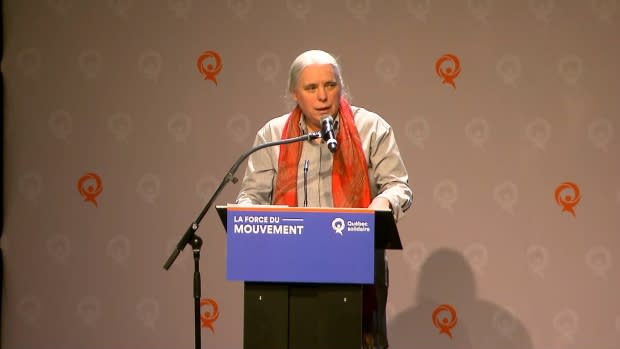Quebec Solidaire divided on secularism at national council
At the Quebec Solidaire national council this weekend in Montreal, two camps emerged on the issue of religious symbols: one of secularism and one of inclusion.
While the party already supports the banning of religious symbols worn by police officers, judges, Crown prosecutors and prison guards, some in the party want to go further — banning public servants including teachers from wearing clothing such as turbans and hijabs.
"Public services must be given in a neutral manner, without interference or bias," said Lise Boivin, who is part of the wing advocating for a complete ban of religious symbols worn by public servants.
That wing of the party finds itself in agreement with Quebec Premier François Legault, who said the day after his victory that he would use the Constitution's notwithstanding clause to pass such a ban if necessary.
The other wing wants the party to stop following the advice of the Bouchard-Taylor report on secularism, which in 2008 recommended only banning such symbols for public servants in positions of "coercive authority."
"This has been dragging on for 10 years and we have seen the social divisions it has brought," said Eve Torres, a party member who ran for a seat in the National Assembly in the Mont-Royal–Outremont riding.
"For me, there is no possible compromise," said Torres, who wears a hijab.
In recent years, one of the secularism report's authors, Charles Taylor, has said he no longer believes that any ban is necessary.
The delegates will prepare a motion on secularism Sunday that will be debated by the party's regional associations before its convention in March of next year, where the party will determine its position on the issue.
Environment at heart of party identity

Climate change featured heavily in the weekend council at Collège Maisonneuve, with delegates pausing Saturday to take part in a march in Montreal demanding for action from world leaders as they gather for the United Nations Climate Change Conference (COP24) in Poland.
The party, which gained official status for the first time, sees itself as the real opposition when it comes to the environment.
"We must put in place the necessary transition," said QS co-spokesperson and parliamentary leader Manon Massé, to avoid the kind of backlash currently seen in France against increases in fuel taxes proposed by French President Emmanuel Macron.
That transition to a greener future is at the heart of the party's platform, the party's other spokesperson, Gabriel Nadeau-Dubois, said at in a speech Sunday.
"The future of the independence movement comes through the economic, ecological and energy transition of Quebec. It comes through the exit of the petro-state of Canada," he said to applause from delegates.

